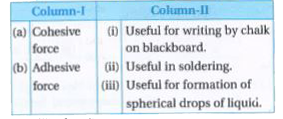Water rises to a height of 20 mm in a capillary . If the radius of the capillary is made 13 rd of its previous is made then what is the new value of the capillary rise ?Solution in Gujrati
h∝1R h.=hRR.=(RR3)∴hh=RR h.=3h
=3(20)=60mm
Topper's Solved these Questions
- BOOK - KUMAR PRAKASHANCHAPTER - MECHANICAL PROPERTIES OF FLUIDS EXERCISE - SECTION -C (Objective Questions) (VSQs) Fill in the Blank9videos
MECHANICAL PROPERTIES OF FLUIDS
- BOOK - KUMAR PRAKASHANCHAPTER - MECHANICAL PROPERTIES OF FLUIDS EXERCISE - SECTION -C (Objective Questions) (VSQs) Match Type Questions6videos
MECHANICAL PROPERTIES OF FLUIDS
- BOOK - KUMAR PRAKASHANCHAPTER - MECHANICAL PROPERTIES OF FLUIDS EXERCISE - SECTION - B Numerical From DARPAN Based On Textbook17videos
MECHANICAL PROPERTIES OF FLUIDS
- BOOK - KUMAR PRAKASHANCHAPTER - MACHANICAL PROPERTIES OF SOLIDS EXERCISE - QUESTION PAPER11videos
MACHANICAL PROPERTIES OF SOLIDS
- BOOK - KUMAR PRAKASHANCHAPTER - MOTION IN A STRAIGHT LINE EXERCISE - QUESTION PAPER11videos
MOTION IN A STRAIGHT LINE
Similar Questions
Angle of contact increases with rising temperature of liquid .
01:16View SolutionForce in Column -I and its use is in Column -II are given .Match them appropriately.
 03:03View Solution
03:03View SolutionIt is known that density ρ of air decreases with height y as
−y/y0
ρ=ρoe
where ρo=1.25kgm−3 is the density at sea level and yo is a constant . This density variation is called the law of atmospheres. Obtain this law assuming that the temperature of atmosphere remains a constant (isothermal conditions).Also assume that the value of g remains constant.
(b) A large He balloon of volume 1425m3 is used to lift a payload of 400 kg . Assume that the balloon maintains constant radius as it rises . How high does it rise ? (yo=8000mandρHe=0.18kgm−3).01:37View SolutionWhat is called brittle material ?
01:36View SolutionDefine frame of reference and give its types.
04:06View SolutionWater rises to a height of 20 mm in a capillary if the radius of the capillary is made one third of its previous value then what is the new value of the capillary rise?
View SolutionIf a capillary of radius r is dipped in water the height of water that rises in it is h and its mass is M . If the radius of the capillary is doubled the mass of water that rises in the capillary will be
03:37View SolutionWater rises to a height of 30 mm in a capillary tube. If the radius of the capillary tube is made 3//4 of its previous value. The height to which the water will rise in the tube is
02:44View SolutionWater rises to a height of 20 mm in a capillary. If the radius of the capillary is made one-third of its previous value, then the new value of capillary rise will be
02:44View Solution(A) एक केशनली में जल 6 सेमी ऊपर चढ़ता है। एक दूसरी केशनली में, जिसकी आन्तरिक त्रिज्या पहली केशनली की 23 गुनी है, जल किस ऊँचाई तक चढ़ेगा?
(B) एक केशनली में जल 4 सेमी की ऊँचाई तक चढ़ता है। यदि किसी अन्य केशनली की अनुप्रस्थ काट का क्षेत्रफल एक-चौथाई हो तो जल किस ऊँचाई तक चढ़ेगा?02:44View SolutionWater rises to a height of 30 mm in a capillary tube , if the radius of the capillary tube is made (3//4)^(th) of the previous value , then the height to which the water rise in the tube will be
02:44View SolutionWater rises to a height of 2 cm in a capillary tube . If its diameter is made (2/3)rd , the water will now rise to a height of
02:29View SolutionA cappilary of diameter d mm is dipped in water such that the water rises to a height of 30 mm. If the radius of the capillary is made ((2)/(3)) of its previous value, then compute the height up to which water will rise in the new capillary ?
02:14View SolutionA cappilary of diameter d mm is dipped in water such that the water rises to a height of 30 mm. If the radius of the capillary is made (23) of its previous value, then compute the height up to which water will rise in the new capillary ?
02:46View SolutionA cappilary of diameter d mm is dipped in water such that the water rises to a height of 30 mm. If the radius of the capillary is made (23) of its previous value, then compute the height up to which water will rise in the new capillary ?
01:43View Solution
